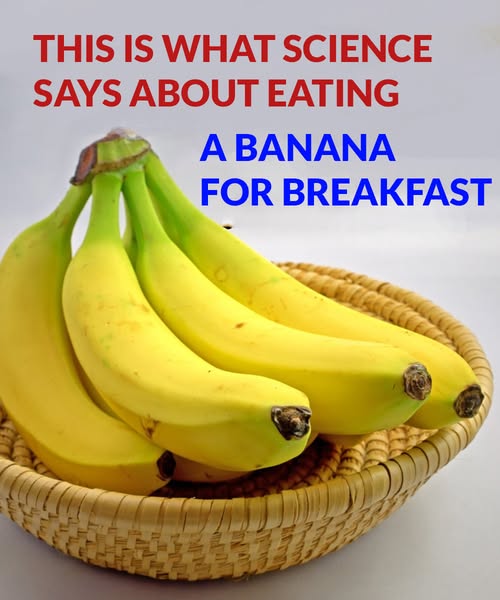ADVERTISEMENT
**This Is What Science Says About Eating a Banana for Breakfast**
When it comes to choosing the perfect breakfast, many of us find ourselves in a bit of a dilemma. We want something that’s quick, nutritious, and will keep us energized throughout the morning. Enter the humble **banana**—one of the most popular and widely consumed fruits in the world. Not only is it easy to grab on the go, but bananas are also packed with a variety of essential nutrients. But what exactly does science say about eating a banana for breakfast? Can it really be a healthy and energizing start to your day? Let’s break it down.
—
### **Nutritional Breakdown of a Banana**
Before diving into the science, let’s take a look at what’s inside a banana. One medium-sized banana (about 118 grams) typically contains:
– **Calories**: 105
– **Carbohydrates**: 27 grams (including 14 grams of sugar)
– **Fiber**: 3 grams
– **Protein**: 1 gram
– **Fat**: 0.3 grams
– **Vitamins and minerals**: Rich in Vitamin C, Vitamin B6, potassium, magnesium, and antioxidants.
With this simple yet nutrient-packed profile, it’s easy to see why bananas are considered a great option for breakfast.
—
### **The Science Behind Eating a Banana for Breakfast**
#### **1. Provides a Quick Energy Boost**
Bananas are rich in **carbohydrates**, primarily natural sugars like glucose, fructose, and sucrose. These sugars are easily digestible and provide a quick source of energy. In fact, they’re often favored by athletes before or after a workout for this very reason. The carbohydrates in bananas can give you a natural energy boost in the morning without the crash that often follows sugary cereals or processed breakfast foods.
Moreover, bananas have a **low glycemic index (GI)**, meaning they don’t cause a rapid spike in blood sugar. Instead, they release their sugar slowly into the bloodstream, providing a steady source of energy that can help keep you feeling full and satisfied for longer.
#### **2. Supports Heart Health with Potassium**
One of the standout features of bananas is their high **potassium** content. A medium-sized banana contains about **400-450 milligrams of potassium**, which is about 10% of the recommended daily intake. Potassium is a key mineral for maintaining **proper heart function**. It helps regulate blood pressure by balancing the effects of sodium in the body, which is crucial for overall cardiovascular health.
A diet high in potassium can also reduce the risk of stroke, lower blood pressure, and prevent kidney stones. Starting your day with a banana is an easy way to ensure you’re getting a good dose of this vital mineral.
#### **3. Helps with Digestion and Gut Health**
Bananas are a great source of **dietary fiber**, particularly **pectin**, a type of soluble fiber that helps regulate digestion. Fiber is essential for healthy bowel movements and can help prevent constipation, which is a common issue for many people.
The fiber in bananas also supports **gut health** by promoting the growth of beneficial bacteria in the digestive tract. Additionally, bananas contain a small amount of **resistant starch** (especially when they are less ripe), which acts as a prebiotic. Prebiotics feed the good bacteria in your gut, helping to improve overall digestion and support immune function.
#### **4. Regulates Blood Sugar Levels**
You might be wondering, “But don’t bananas have a lot of sugar?” While it’s true that bananas contain sugar, it’s important to note that the **fiber** in bananas helps slow the absorption of sugar into the bloodstream, preventing rapid spikes and crashes in blood sugar levels.
This makes bananas a good option for individuals with **type 2 diabetes** or those looking to stabilize their energy levels throughout the day. The **fiber** and **low glycemic index** of bananas contribute to better blood sugar management, making them a safe and healthy choice for breakfast.
For Complete Cooking STEPS Please Head On Over To Next Page Or Open button (>) and don’t forget to SHARE with your Facebook friends
#### **5. Rich in Vitamin B6: A Mood and Brain Booster**
